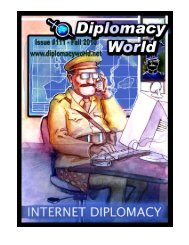Diplomacy World #103 - Fall 2008 Issue
Diplomacy World #103 - Fall 2008 Issue
Diplomacy World #103 - Fall 2008 Issue
You also want an ePaper? Increase the reach of your titles
YUMPU automatically turns print PDFs into web optimized ePapers that Google loves.
What Does a 16-Year-Old Supple Chinese Gymnast Have<br />
That You Need?<br />
By Mark Zoffel<br />
The answer? Flexibility and staying power!<br />
All too often in a beginners game of <strong>Diplomacy</strong>, as well<br />
as in high level games, whether it be FTF or E-Mail, I am<br />
constantly astonished how many games end. For<br />
beginners it is somewhat understandable, as many don't<br />
know what they have gotten themselves into, and just<br />
throw up their hands and walk away after 5 hours of<br />
mental torture, or will vote for anything brought up. I<br />
accept their response as adequate. For those<br />
intermediate or advanced, I call it lack of flexibility and<br />
staying power. This article will be the first of many that<br />
discusses what makes a good Dip player, both<br />
Strategically, Tactically, and Diplomatically, better.<br />
Playing <strong>Diplomacy</strong> requires many skills other than<br />
knowing how and where to move, persuading people to<br />
go along with your ideas,etc.,etc.. Many players become<br />
good players due to their understanding of the correct<br />
moves to make, the best alliances to form, and the short<br />
and long term implications of each move turn by<br />
turn. Many play this way game after game, year after<br />
year, and become good, sometimes great. My object in<br />
this article is to try and add the word flexibility to one’s<br />
arsenal as well as a never give up attitude when<br />
playing. There are exceptions, but in general I find too<br />
many good to great players lacking in these two very<br />
important parts of the game of <strong>Diplomacy</strong>.<br />
Example #1-Actual game<br />
<strong>World</strong> Class Board filled with world champions and the<br />
best minds in the game. Play begins with everyone<br />
doing what they do best: discussion, observations, and<br />
<strong>Diplomacy</strong> <strong>World</strong> <strong>#103</strong> - Page 22<br />
strategy. Fast forward 4 hours; 3 players have pulled<br />
out in front from a unit count, but everyone is still playing<br />
and having a chance to win. The player playing<br />
Germany is down to 2 centers, but is still fighting tooth<br />
and nail to achieve his goal. He played that way until the<br />
end. He showed a flexibility to change his long term<br />
goals of winning, to the short term goals of surviving,<br />
then the possibility to go back to his long term goals. He<br />
also showed true grit (John Wayne style) toward the<br />
game, as it was going to be a long haul, and his chances<br />
were low. Across the board in Turkey, another quality<br />
and distinguished player down to three centers, has<br />
mentally given up and begun to talk with another eastern<br />
power, also down to three units, about everything but<br />
<strong>Diplomacy</strong> and this game. This wasn't tactics by either<br />
player, but simply throwing in the towel. What<br />
happened? Their plans and goals at some point<br />
became in their minds, unattainable. Their problem?<br />
The flexibility to change their plans and the lack of<br />
staying power to stick it out.<br />
This scenario plays itself out over and over again<br />
throughout the hobby, and if players would learn to come<br />
into the game with an open mind and the flexibility to<br />
change their play throughout the game, their overall<br />
success rate would increase...especially when combined<br />
with the fortitude to fight on to the end, even when the<br />
outcome looks unchanging or hopeless. The best<br />
gamblers in Vegas win a little over 50% of the time,<br />
depending on their game. The temperature of water<br />
becoming steam is 212 degrees. At 211 nothing. At 212<br />
Steam. One degree more. In <strong>Diplomacy</strong>, giving yourself<br />
that last percent will often change the outcome of the<br />
game, so why not do it? That is what the best of the<br />
best do and should be a road map for the rest of us, as<br />
you never know what will happen unless you try.<br />
Nothing ventured nothing gained. Preparing yourself for<br />
this doesn't just happen at the point of decision, but can<br />
be consciously thought about prior to beginning the<br />
game, and even prior to showing up for the game. Make<br />
it apart of your overall strategy, and that one time it<br />
works and you turn a game around that you and others<br />
thought un changeable in its outcome, you will feel more<br />
accomplishment than any mere win, and the knowledge<br />
that you have attained the highest level of play.<br />
Next edition: Players who are overrated, and why.<br />
Mark Zoffel is the <strong>Diplomacy</strong> <strong>World</strong> Strategy &<br />
Tactics Editor.




